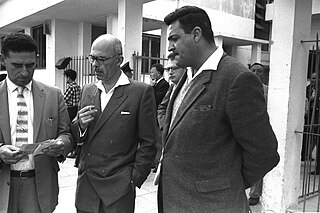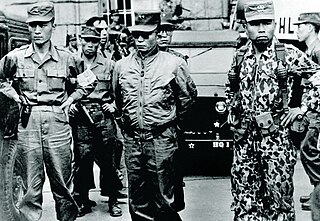 W
WSummit Conference of Heads of State or Government of the Non-Aligned Movement on 1–6 September 1961 in Belgrade, Yugoslavia was the first conference of the Non-Aligned Movement. A major contributing factor to the organization of the conference was the process of decolonization of a number of African countries in the 1960s. Some therefore called it the ″Third World's Yalta″ in reference to 1945 Yalta Conference.
 W
WIsrael Beer was an Austrian-born Israeli citizen convicted of espionage. On March 31, 1961, Beer, a senior employee in the Israeli Ministry of Defense, was arrested under suspicion of espionage for the Soviet Union. A former lieutenant colonel in the IDF, Beer was a well-known military commentator and an acknowledged expert on military history, and he was employed in a civilian position within the Israeli Ministry of Defense to write a book on the history of the 1947–1949 Palestine war. His true identity, his personal history before emigrating to Palestine, and the circumstances of his recruitment to the KGB, have all remained unknown to this day.
 W
WThe Berlin Crisis of 1961 occurred between 4 June – 9 November 1961, and was the last major European politico-military incident of the Cold War about the occupational status of the German capital city, Berlin, and of post–World War II Germany. The Berlin Crisis started when the USSR issued an ultimatum demanding the withdrawal of all armed forces from Berlin, including the Western armed forces in West Berlin. The crisis culminated in the city's de facto partition with the East German erection of the Berlin Wall.
 W
WThe Berlin Wall was a guarded concrete barrier that physically and ideologically divided Berlin from 1961 to 1989. Construction of the wall was commenced by the German Democratic Republic on 13 August 1961. The Wall cut off West Berlin from surrounding East Germany, including East Berlin. The barrier included guard towers placed along large concrete walls, accompanied by a wide area that contained anti-vehicle trenches, beds of nails and other defenses. The Eastern Bloc portrayed the Wall as protecting its population from fascist elements conspiring to prevent the "will of the people" from building a socialist state in East Germany.
 W
WMorris Cohen, also known by his alias Peter Kroger, was an American convicted of espionage for the Soviet Union. His wife Lona was also an agent. They became spies because of their communist beliefs.
 W
WThe May 16 military coup d'état was a military coup d'état in South Korea in 1961, organized and carried out by Park Chung-hee and his allies who formed the Military Revolutionary Committee, nominally led by Army Chief of Staff Chang Do-yong after the latter's acquiescence on the day of the coup. The coup rendered powerless the democratically elected government of Prime Minister Chang Myon and President Yun Posun, and ended the Second Republic, installing a reformist military Supreme Council for National Reconstruction effectively led by Park, who took over as chairman after General Chang's arrest in July.
 W
WKonon Trofimovich Molody was a Soviet intelligence officer, known in the West as Gordon Arnold Lonsdale. Posing as a Canadian businessman during the Cold War he was a non-official (illegal) KGB intelligence agent and the mastermind of the Portland Spy Ring, which operated in Britain from the late 1950s until 1961.
 W
WThe Vienna summit was a summit meeting held on June 4, 1961, in Vienna, Austria, between President John F. Kennedy of the United States and Premier Nikita Khrushchev of the Soviet Union. The leaders of the two superpowers of the Cold War era discussed numerous issues in the relationship between their countries.